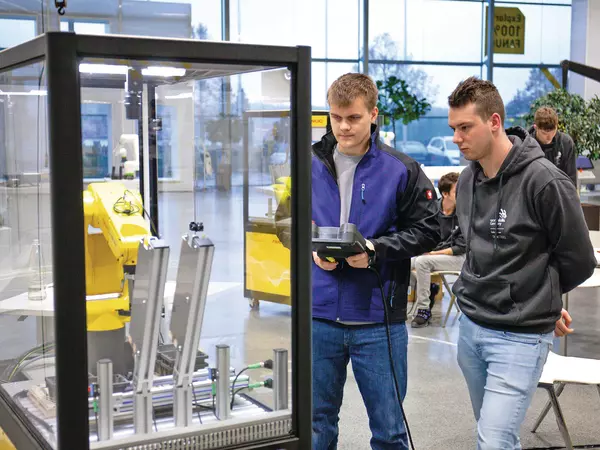


From November 28 to 30, 2022, the German championship of WorldSkills Germany in the discipline Robot Systems Integration was hosted by FANUC Deutschland in Neuhausen auf den Fildern. A total of ten participants in five teams faced the competition over a period of three days. The two SCHUNK mechatronics engineers Tim Vogel and Lukas Röser took part where they ended up winning the competition. In 2023, they will be able to demonstrate their skills and expertise at the European Championship in Danzig.
The age limit for this competition is 25 years. In future, trainees will also be able to compete in the Robot Systems Integration discipline. "We'll be there," says Hans Krauss, mechatronics trainer at SCHUNK. "Because by participating in this competition, we are already showing our apprentices during their training that they can achieve a lot in their profession," Krauss affirms. "Our apprentices regularly celebrate successes in national competitions. This spurs them on and specifically promotes their skills. The WorldSkills Vocational Olympiad consolidates young people's commitment in a special way. They realize that they can work out a great goal for themselves and even participate in an international championship. We want to support that."
A focus on education is a central hallmark in SCHUNK's tradition. The family-owned company regularly invests in holistic and future-oriented training for its young talents at the Lauffen/Hausen, Mengen and St. Georgen locations. Basic craftsmanship skills, digital learning content and working with state-of-the-art machine and plant technology are part of the training program, as are social commitment, involvement in inclusion projects and individual, personal development. At SCHUNK, young people can find their profession for life and actively shape their future. It pays off: More than 95 percent of the trainees stay with the company once they have successfully completed their training.

WorldSkills Germany is a globally networked organization that focuses on the potential of the best educational approaches thanks to the international exchange. The concept helps to improve the local training landscape and make it even more attractive – with exciting regional, national and international vocational competitions, networking between politics and business, targeted public relations, and innovative projects. Every two years, trainees and young professionals from all over the world compete in a public international competition, alternating between the vocational World Championships and European Championships. They measure their skills in the individual professions in compliance with demanding international standards. The competitors qualify for the European or World Championships in each case through national selection procedures. Germany is currently represented in over 40 disciplines at EuroSkills and WorldSkills.